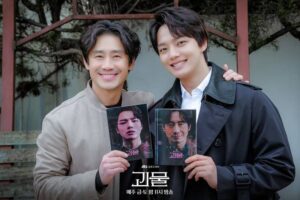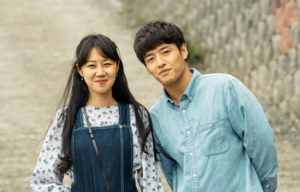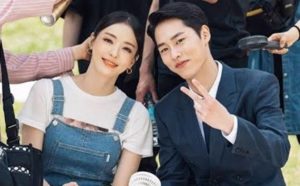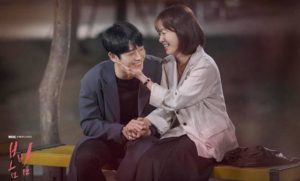“Hit-and-Run Squad” (뺑반)

I’m so used to seeing Jo Jung-Suk play the good guy (“Hospital Playlist,” “Oh My Ghost”) that it was fun to watch him chew up the scenery as a bad-boy rich guy who is brutal, immoral and nasty.
Journalist, Author & Syndicated Columnist

I’m so used to seeing Jo Jung-Suk play the good guy (“Hospital Playlist,” “Oh My Ghost”) that it was fun to watch him chew up the scenery as a bad-boy rich guy who is brutal, immoral and nasty.

“Beyond Evil” is one weird (in an interesting way) Korean series that centers on the search for a serial killer, who murdered multiple women — including the protagonist’s younger sister. Virtually all the major characters are suspects at one point or another, with damning evidence that has been carefully weaved into the storyline.

The showrunners behind “Vincenzo” took their time in letting the highly engaging story unfold in a believable way. Well, as believable a story as you can have about a Korean-born child who ends up becoming a consigliere for a top mafia don in Italy. This series is one of Song Joong-Ki’s strongest K-dramas.

“Sweet Home” has some incredible highs. But unlike “Kingdom” or “Uncanny Counter,” where action supplements the storyline, “Sweet Home” has too much mediocre filler to make it a truly great K-drama.

Once “Seoul Searching” gets past the caricatures, the story delves into the deeper meaning of what it means to be Korean in societies that view you as a perpetual foreigner. Though the film concentrates on Korean Americans, two of the more memorable characters are Korean teens raised in Germany (Klaus, played by Teo Yoo) and Mexico (Esteban Ahn’s Sergio).

Park Min-Young and Seo Kang-Joon are both skilled actors, whose expressions convey the complicated emotions their characters have. Neither had an easy life and they are almost fearful of expecting — or even wanting — more than what they have.

“When the Camellia Blooms” starts off with so many things happening at once that it’s initially difficult to focus on all the different story arcs: a serial killer, small-town pettiness, marital issues and the possibility of romance. But as the series progressed, each consecutive episode found its focus and finished with a sweet and satisfying finale that felt true to the characters. There is death and sadness dotted throughout the series. But at its core, “Camellia” is a story of love — not just between a man and a woman, but between parents and their children.

“Search: WWW” is the only K-Drama I can think of where women had the kind of lead roles that ordinarily would’ve gone to men. The female characters not only were the rainmakers where they worked, they were the decision makers who the men followed.

It’s not surprising that “One Spring Night” has the same melancholy vibe as “Something in the Rain” (aka “Pretty Noona Who Buys Me Food”). Besides the same leading man, the series reunites screenwriter Kim Eun and director Ahn Pan-Seok. While the storyline is different, the main thrust remains the same: The central male character is deemed as unsuitable to be with the female character, because of an unforgivable character flaw that isn’t a flaw at all.

Like most Korean dramas, there is a love triangle in “Ms. Hammurabi.” The difference is that there are so many interesting plots developing here that I cared more about the human rights issues that the judges were fighting for than the romance.

“Her Private Life” starts off as a clever comedy about Sung Duk-Mi — a cultured art curator who also is a diehard fangirl. But it also deftly tackles child abandonment, reunification and forgiveness. The concept of what constitutes a family was a recurring theme. It was refreshing to see that relationships based on bloodlines weren’t the only ones valued and that families are sometimes borne from tragic circumstances.

I finished watching the final episode of “Kill Me, Heal Me” early this morning, and I am left with a sense of melancholy — not because the ending was unhappy (it wasn’t), but because the series was so good I wanted to see more. This K-Drama unravels at a languid pace. As each new backstory is revealed, it felt like a jolt to my heart.

K-Dramas tackle topics not often talked about in everyday conversation. By doing so, they bring some important subject matters, like adoption, to the forefront.

I was going to review “Pinocchio” simply as I would any other K-Drama. But I started to write this at the same time that Soon-Yi Previn broke her silence about her relationship with Woody Allen (her husband) and Mia Farrow (her adoptive mother, and Allen’s former long-time girlfriend) — and that affected my take on this Korean drama. Is it wrong for family members who aren’t biologically-related to have a romantic relationship? If you condemn Allen and Previn, can you condone the two lead characters in this series?

I finished watching “I Hear Your Voice” around the same time that I started “Pretty Noona Who Buys Me Food.” Both deal with older women/younger men plots, where the woman is about eight years older than her partner. The problem I had with “I Hear Your Voice,” though, is that the boy is a high school senior when the relationship begins. And while Soo-Ha certainly is more mature than Hye-Sung in many ways, he is still a teenager.

A common element running throughout the plot is that you are not a “real” child if you don’t share your parents’ DNA. One of the central characters views herself as superior to her adopted sister, because … adoption. The emphasis on a family’s pure bloodline is still in effect today in Korea. And though more adoptive families are telling their children about their adoption stories, many still let their kids assume they are biologically related to their adoptive parents.

One of the things I enjoy about Korean dramas is that many tend to focus of the main characters’ childhood friendships and how that camaraderie evolves into their adulthood. Such is the case here, where four friends grow up with each other and, eventually, end up falling in and out of love with each other.

The heroine of this Korean drama is the epitome of a long-suffering doormat, whose life would’ve been so much better if she grew a spine and stood up for herself. Instead of being guilted into giving up her hard-earned money — that she had ear-marked for returning to college — to her ungrateful older half-sister, who is “studying” overseas in the United States; or giving up her own body, so that she can pay for her father’s surgery; or letting virtually everyone treat her like a servant … Eun-Nim just swallows her pride and accepts it as her life.

Let’s cut to the chase: the plot revolves around a high school student and a doctor who switch bodies after an accident. Yoon-Jae, the 30something doctor is in a vegetative state in the body of 17-year-old Kyung-Joon. Meanwhile, the teenager is alive and well, but he is trapped in the buff body belonging to Gong Yoo, er, I mean Yoon-Jae. Caught between these two is Gil Da-Ran, a wet dishrag of a woman, who (despite her beauty) has absolutely no confidence in herself. When she realizes that Yoon-Jae really isn’t Yoon-Jae and that it may take a while for the two to switch bodies again, she plays along with the charade.

If I were to rate this series, I would give it a 